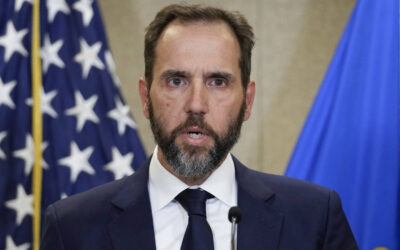National Legal and Policy Center presented a “Humanitarian Risks Due to Climate Change Policies” proposal at the JPMorgan Chase & Co.‘s 2024 annual meeting of shareholders today. The proposal asks the company to conduct an audit of its climate policies and release a report on how they may negatively effect the economic and humanitarian development of emerging nations.
JPMorgan’s board of directors opposed our proposal, as explained on pages 95-95 of the company’s 2024 proxy statement. NLPC’s response to the board’s opposition statement was filed with the Securities and Exchange Commission last month.
Speaking as sponsor of the proposal was Luke Perlot, associate director of NLPC’s Corporate Integrity Project. His three-minute remarks can be heard here, and a transcript follows:
Good morning,
My name is Luke Perlot, and I am presenting on behalf of the National Legal and Policy Center.
JPMorgan claims its commitments to the carbon emissions reduction targets and net zero 2050 goals outlined in the Paris Agreement are necessary.
To that end, the firm plans to dramatically reduce the carbon intensity of its energy sector lending portfolios by 2030.
JPMorgan believes that if more companies do not take similar commitments to catalyze the energy transition and reduce the global usage of hydrocarbon energy, anthropogenically driven climate change will result in catastrophic effects to the environment, to the planet, and to humans.
Yet the research increasingly shows that the narrative of catastrophic climate change is over-exaggerated and misleading.
The apocalyptic scenarios used to justify rapid decarbonization are pushed by politicians, not scientists, and they are increasingly unlikely, yet the media portrays them as the default scenario.
Conversely, the negative effects of rapidly reducing the supply of hydrocarbon energy are clear and obvious.
First of all, developing nations rely heavily on affordable energy from fossil fuels.
According to the International Energy Agency, nearly 760 million people – who primarily live in Africa and Asia – still lack access to electricity.
Secondly, when energy prices rise, oil-importing nations in Africa, Asia, and Latin America are hit the hardest, because of high import prices and weaker currencies, also according to the IEA.
The pivot away from fossil fuels, without adequate and affordable alternatives, will inflate energy costs, reduce energy availability, and stifle economic growth in these vulnerable regions.
As a result, JPMorgan’s allegiance to the Paris Agreement via its energy transition goals are at odds with its commitment to the United Nations Sustainable Development Goals, particularly the first goal of ending poverty.
NLPC’s Proposal asks JPMorgan to conduct an audit of the economic and humanitarian effects, both adverse and beneficial, of its policies, particularly on developing nations.
Some of the Company’s clients may be legitimately concerned with climate change, this is not the issue.
The issue is that the Company has made decisions on behalf of all its clients’ assets based on the opinion of a small subset of the political spectrum.
NLPC urges the Board to examine all sides of this issue by conducting an audit of the negative economic and humanitarian effects of its climate policies, and we urge our fellow shareholders to vote FOR Proposal 6.
Thank you.
Read NLPC’s shareholder proposal for the JPMorgan annual meeting here.
Listen to Luke Perlot’s presentation of the proposal at the meeting here.
Read NLPC’s response, filed with the SEC, to the company’s opposition to our shareholder proposal, here.








